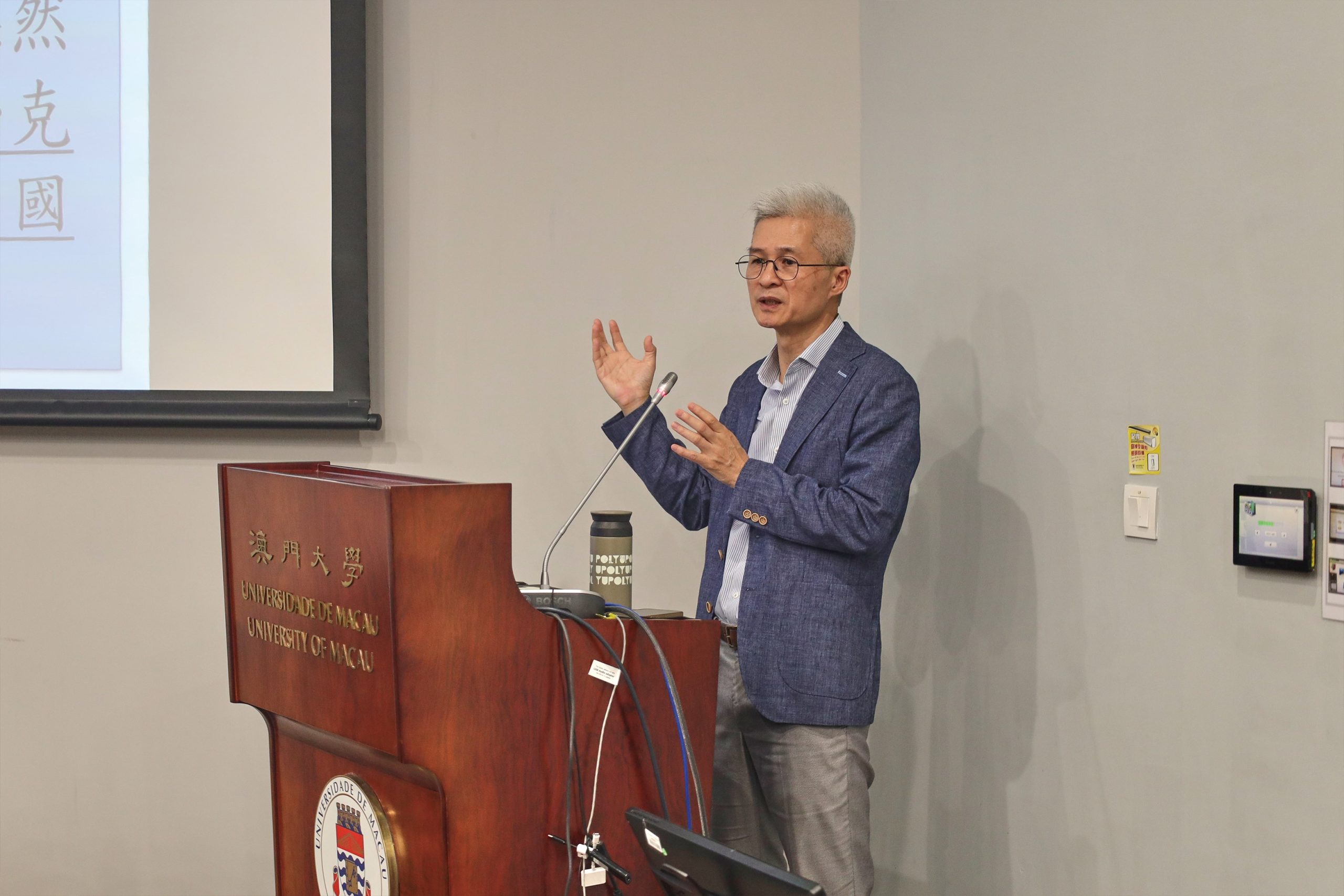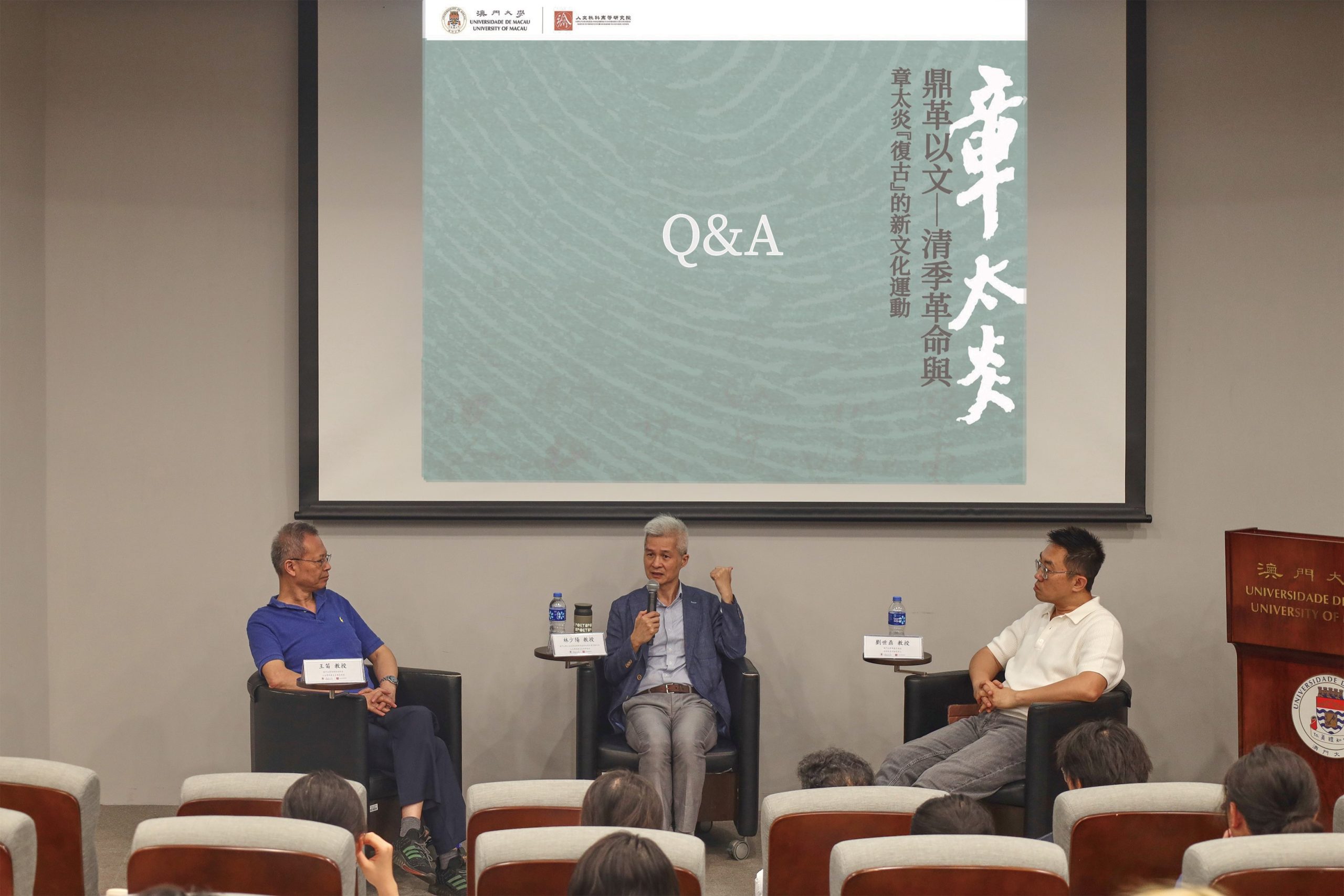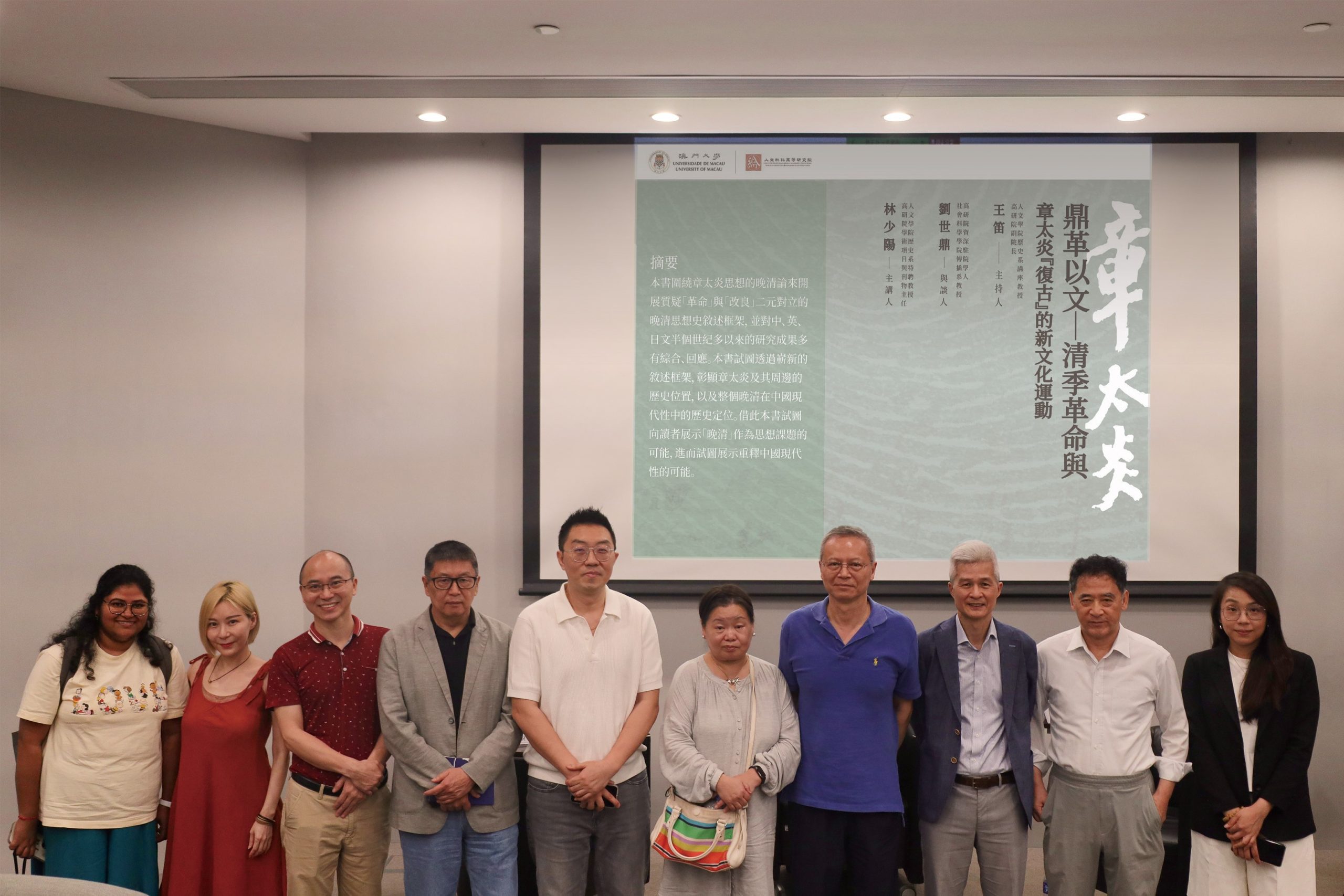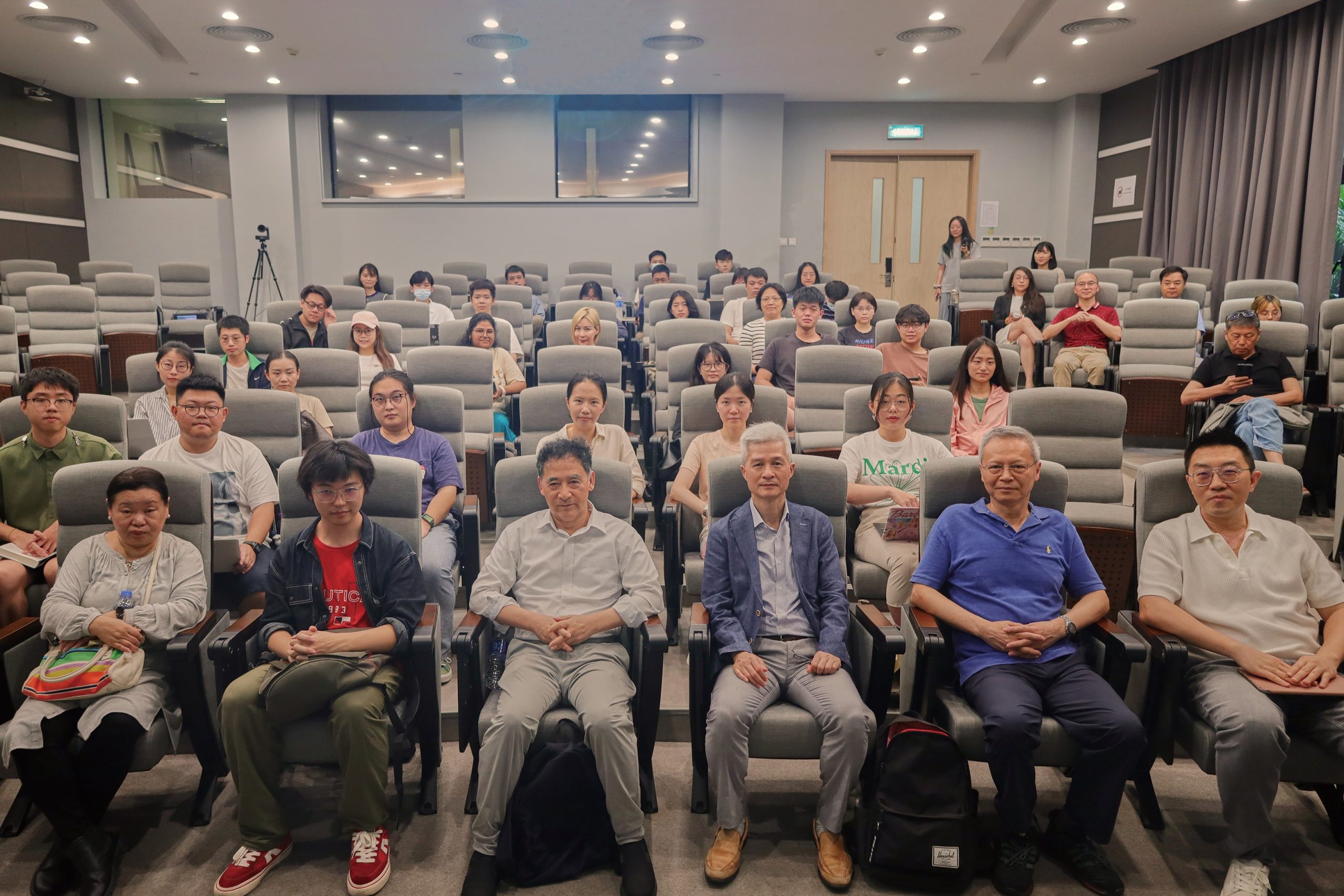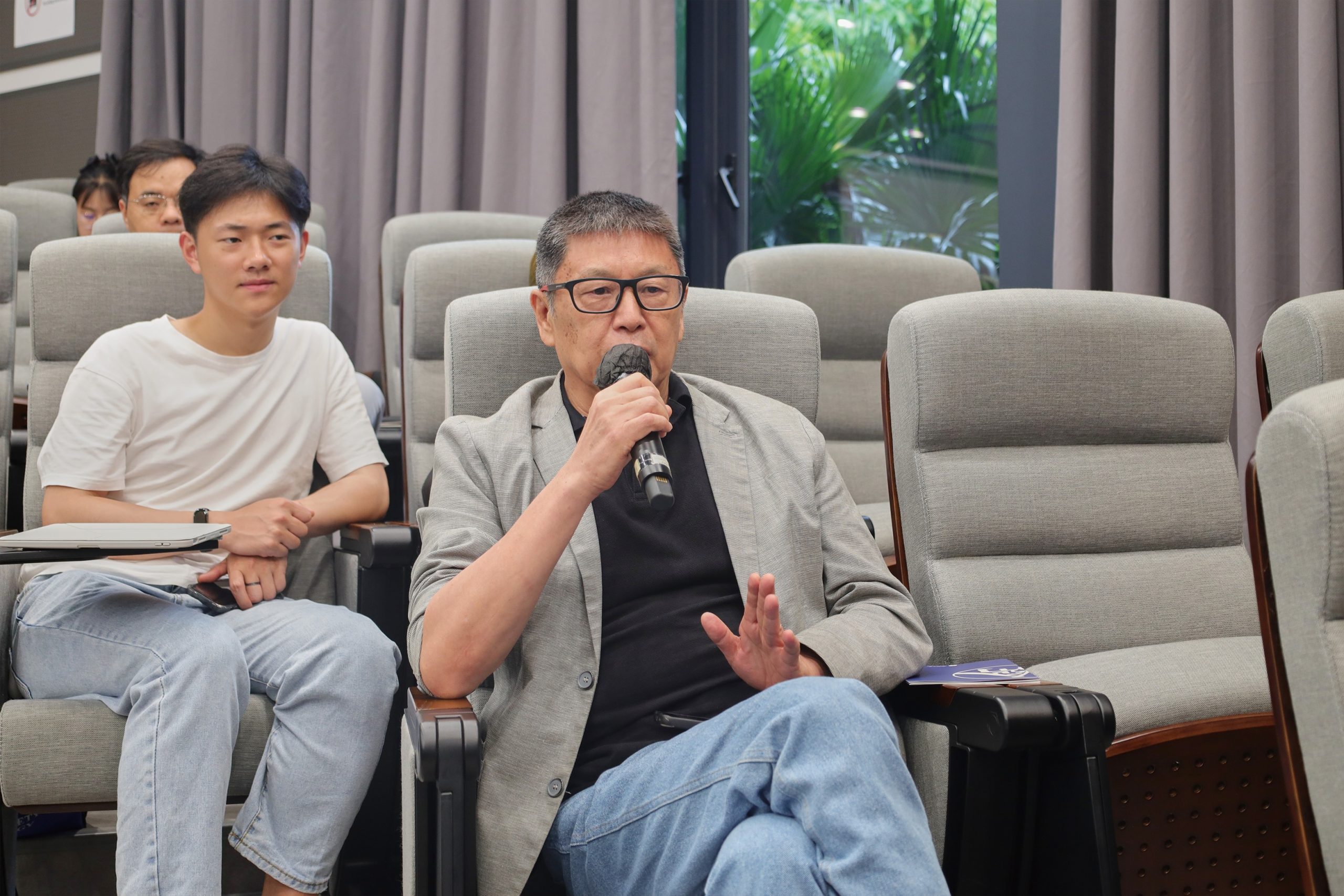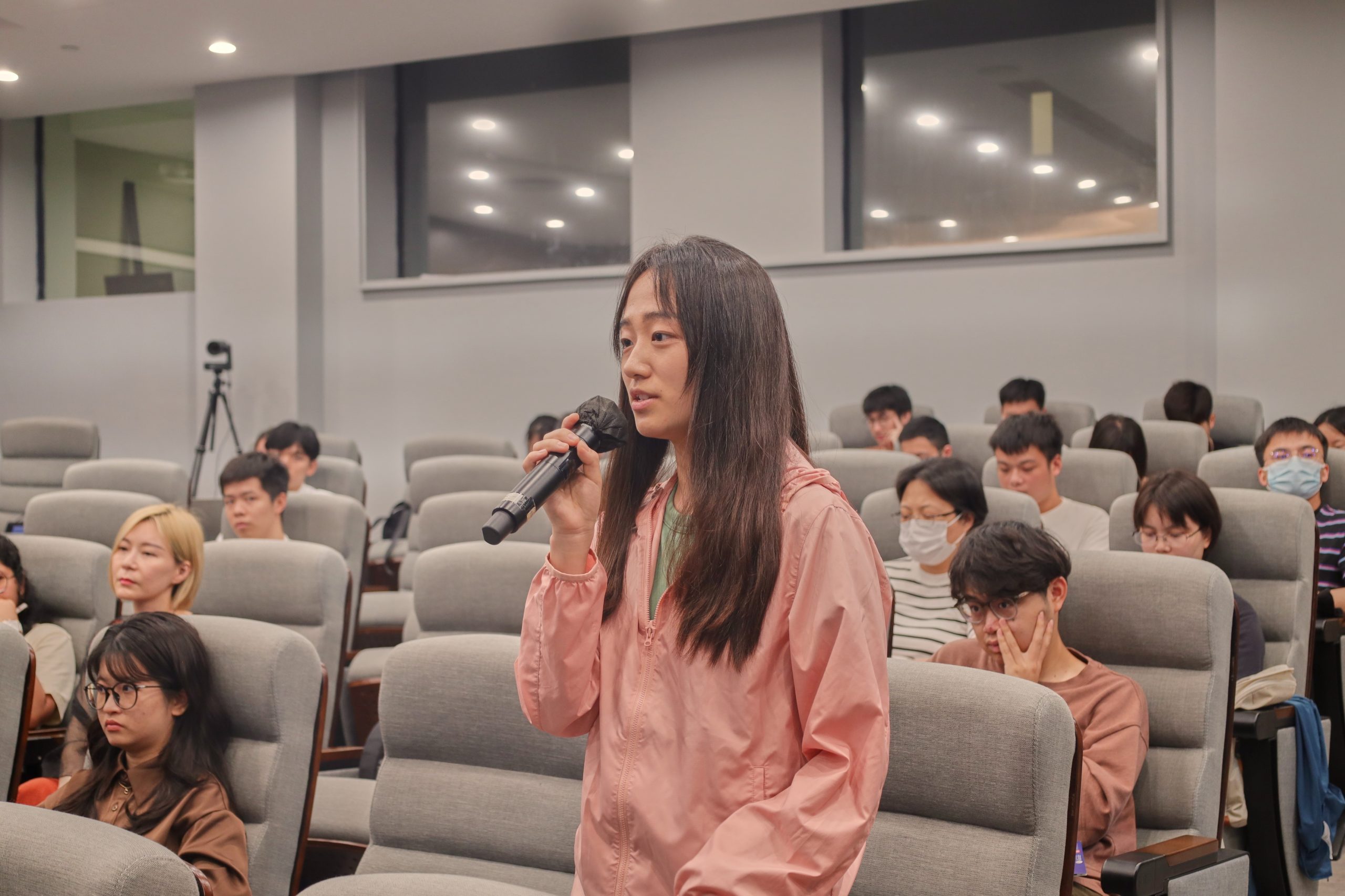【IAS】 IAS Lecture on Frontiers in Humanities: “Revolution by means of Culture: the late Qing Revolution and Zhang Taiyan” was successfully conducted
【高研院】高研院崇文講座:《鼎革以文–清季革命與章太炎“復古”的新文化運動》圓滿舉行

由高研院舉辦的2023-2024學年崇文講座之《鼎革以文–清季革命與章太炎“復古”的新文化運動》書本分享會於4月22日在崇文樓成功舉辦,本次講座主講人為高研院學術項目與刊物主任、人文學院歷史系特聘教授─林少陽教授,同時亦邀請社會科學學院傳播系教授,高研院資深駐院學人─劉世鼎教授擔任與談人,高研院副院長、人文學院歷史系講座教授─王笛教授擔任主持人。
講座中,林教授對章太炎的政治思想做了深度解讀,亦談論了學界對於章太炎的定位和評價、新文化運動以及辛亥革命等背景,並提出“新文化運動與人們關於辛亥革命的主流解釋之間貌似無關,實則相連“這一觀點。而後,他又針對“革命和改良的二元對立問題”發表了自己的見解。他認為,改良與革命並不能做徹底的分化,二者相互聯繫,無論改良還是革命都深刻影響了中國的現實政治。在對於辛亥革命的解讀中,林教授指出,在看待歷史事件時,可以以更廣袤的時間和空間維度去看待該事件,這種視角下所得到的對事件的評價與主流認為的“某一短時段”的事件評價有所不同,也更能發現被忽略的點。最後,林教授總結了晚清革命的構成:1)武裝暴動;2)自治運動;3)以“文”為手段的革命。在講述本書的目的時,林教授表示,他試著圍繞章太炎及其周邊的歷史位置,以及整個晚清在中國現代性中的歷史定位,重構什麼是社會主義,重釋中國現代性。
在討論環節,王笛教授發表了自己的見解。他認為,如何理解革命很重要。他非常認同林教授所提出的通過更長、更廣的時間、空間維度去看歷史事件這一觀點。而對於改良和革命之間的複雜關係的理解也非常重要,兩者是如何聯繫又如何轉變的。劉世鼎教授則從情緒和精神的角度做出瞭解讀。他提出,這本書涉及到了各類問題,如民族主義、國家、自治等,而這些問題對於當下的很多社會問題仍舊擁有解釋力。同時他也對章太炎的精神狀態做出了政治心理學式的解讀。他認為章太炎像一個拒絕被治癒的“神經病”,但他又把“神經病”這個詞轉換為帶有邊緣性的政治語言,提供了另類的文化想像,帶有一定的社會政治批判性。“神經病”這一身份在當下的語境中打開了另一種空間,推動了社會文化變革,屬於一種政治策略。
觀眾提問環節,教授們針對“日本作為晚清革命運動的切入點研究中國近代史”、“如何定義長時間段和短時間段”、“如何區分主觀意願和客觀後果”、“章太炎對於五四運動的評價”、“對文化的理解”等問題展開討論。林教授表示,地理環境的因素和時間長度有非常複雜的關係。不光是時間的問題,還需要考慮更大一點的地理場域。時段沒有特別限定,主要是看研究內容,能對解放平時認知的盲點有意義更重要。他在此書中所談及的“天下”是指更德智、儒家的內容,包含了普遍主義價值,與當下所談論的“天下”的概念有所不同。他認為,在研究當代史的時候,大家應該多打問號,多思考。
本次講座吸引了來自不同領域的師生參加,現場討論氛圍濃烈。本次講座作為一個跨學科交流和合作的平臺,讓參與者們拓寬了視野,開闊了思維,為未來的學術和專業發展注入了活力和動力。
The 2024 Cultural Lecture — the book sharing of “Revolution by Means of Culture: The Late Qing Revolution and Zhang Taiyan”, organized by IAS, was successfully held on 22 April, 2024, at the E34 Cultural Building. Professor Lin Shaoyang from the Department of History, FAH, and the Head of Academic Programme and Publication of IAS was invited to be the speaker; Professor Liu Shih-Diing, Professor of the Department of Communication, FSS, and also the Senior Research Fellow of IAS, was invited to be the discussant; and Professor Wang Di, the Chair Professor of the Department of History, FAH, and Associate Director of IAS, was invited to be the moderator.
During the lecture, Prof. Lin provided a comprehensive analysis of Zhang Taiyan’s political thoughts, the comments towards Zhang Taiyan within the academic community, the social background of the New Culture Movement and the Xinhai Revolution. He posited that “though the New Culture Movement and the mainstream interpretations of the Xinhai Revolution seem to be unrelated, in fact they are connected.” He then articulated his perspective on the dichotomy between revolution and progress. He posited that the dichotomy between progress and revolution has profoundly influenced Chinese realpolitik. In his interpretation of the Xinhai Revolution, Prof. Lin highlighted that when examining historical events, it is possible to consider them within a broader temporal and spatial context; in other words, within a “long duration”. This approach to historical analysis differs from the conventional opinions of events as a “short duration”, and it leads to the identification of overlooked aspects. When it comes to the final part of his speech, Prof. Lin presented a summary of the compositional elements of the late Qing revolution: 1) armed insurrection; 2) autonomy movement; 3) revolution by means of “culture”. When describing the purpose of this book, Prof. Lin stated that he is attempings to reconstruct the general recognition of “what socialism is,” and also to reinterpret Chinese modernity by focusing on the historical position of Zhang Taiyan and his surroundings, as well as on the historical position of the late Qing Dynasty in Chinese modernity.
During the discussion session, Prof. Wang offered some insights on the subject. He posited that the way to understand the revolution is crucia and concurred with Prof. Lin’s perspective of examining historical events through a longer and broader temporal and spatial lens. Additionally, he mentioned that it is vital to grasp the intricate interrelationship between progress and revolution. Prof. Liu, on the other hand, interpreted the book from an emotional and spiritual point of view. He offered a political-psychological interpretation of Zhang Taiyan’s mental state. He posited that Zhang Taiyan is akin to a “psychopath” who resists cure, yet he transforms the term “psychopath” into a political concept, offering an alternative cultural imagination with a certain socio-political critique. The identity of ” psychopath” opens up additional space for discussion in the current context, promoting social and cultural change.
During the Q&A session, the audiences engaged in discourse on a number of topics, including “Japan as an entry point for the late Qing Revolutionary Movement in the study of modern Chinese history,” “how to define the duration of time,” “how to differentiate between subjective will and objective consequences,” “Zhang Taiyan’s opinion of the May Fourth Movement,” and “the understanding of culture”. Prof. Lin stated that the relationship between these factors is complex and cannot be reduced to a simple matter. Instead, it involves a broader geographical field that must be considered. The temporal scope is not constrained by any specific limits but rather depends on the specific focus of the research. What is more crucial is that the research can contribute to the liberation of the blind spots of conventional cognition. The “world” he discussed in this book is a moral and intellectual construct, imbued with universalist values, that differs from the contemporary concept of the “world”. He believed that when studying contemporary history, it is essential to pose more questions and engage in more critical thinking.
The lecture attracted students and faculties from a variety of academic disciplines, fostering a robust exchange of ideas. As a forum for interdisciplinary discourse, the lecture provided an opportunity for participants to expand their knowledge and perspectives, infusing their future academic and professional endeavors with vitality.

